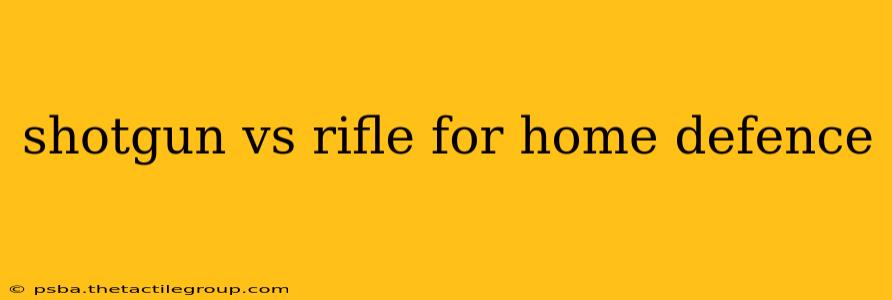Choosing a firearm for home defense is a serious decision with significant implications. This isn't about picking the "coolest" weapon; it's about selecting the tool best suited to neutralize a threat effectively and safely within the confines of your home. This article compares shotguns and rifles for home defense, weighing their respective strengths and weaknesses. Remember, responsible gun ownership includes thorough training and understanding of your chosen firearm and applicable laws.
Shotguns: The Traditional Choice
Shotguns have long been a popular choice for home defense, and for good reason. Their advantages include:
- Stopping Power: Shotgun ammunition, particularly buckshot, delivers devastating stopping power at close range. The spread of pellets increases the likelihood of hitting a vital area, even with less-than-perfect aim.
- Intimidation Factor: The loud report and visible flash of a shotgun can be a significant deterrent, potentially preventing a confrontation altogether.
- Relatively Easy to Use: While proficiency requires practice, the basic mechanics of operating a shotgun are generally easier to master compared to a rifle.
However, shotguns also present some drawbacks:
- Limited Range: The spread of the shot pattern makes shotguns inaccurate beyond a relatively short range (typically under 25 yards). Overpenetration is also a significant concern, especially with buckshot, posing a risk to others within and beyond your home.
- Overpenetration Risk: As mentioned, the potential for overpenetration is a major safety consideration. The pellets can easily travel through walls, posing a danger to neighbors or family members in other parts of the house.
- Recoil: Shotguns, especially those firing heavier loads, can have significant recoil, which can be challenging for some users to manage, especially in a stressful situation.
Rifles: Precision and Control
Rifles offer a different set of advantages and disadvantages in a home defense scenario:
- Accuracy and Range: Rifles offer superior accuracy and a longer effective range compared to shotguns. This is particularly important if the threat is outside your immediate vicinity, or if you need to engage a target through an opening.
- Penetration Control: Rifle ammunition, particularly those using expanding bullets designed for self-defense, often offers better penetration control compared to buckshot. However, careful ammunition selection is crucial to mitigate overpenetration.
- Less Recoil (Generally): Many rifles, particularly those in smaller calibers like .223 Remington or 5.56 NATO, have less recoil than shotguns, making them easier to control for some users.
The drawbacks of rifles for home defense include:
- Steeper Learning Curve: Rifles generally require more training and practice to master than shotguns, demanding more precise aiming and shot placement.
- Overpenetration Potential: While generally better controlled than shotguns, the risk of overpenetration still exists and necessitates careful ammunition selection.
- Potential for Misidentification: In the heat of the moment, it can be easier to mistake a rifle for an assault weapon, potentially escalating the situation with law enforcement.
Choosing the Right Weapon: Key Considerations
The "best" weapon for home defense depends entirely on your individual circumstances, skills, and training. Consider these factors:
- Your Training and Experience: Are you comfortable and proficient with a shotgun or a rifle?
- Your Home's Layout: The size and layout of your home will affect your choice of firearm and ammunition.
- Your Physical Capabilities: Recoil management is a critical factor.
- Ammunition Availability: Ensure easy access to reliable and appropriate ammunition.
- Legal Considerations: Research and understand the laws in your area regarding firearm ownership and use.
Ultimately, the most effective home defense weapon is the one you are most proficient and comfortable using. Invest in professional training and practice regularly to develop your skills and ensure you can safely and effectively use your chosen firearm in a high-stress situation. Remember, firearm safety and responsible gun ownership are paramount. This information is for educational purposes only, and you should consult with law enforcement and firearms professionals for personalized guidance.

